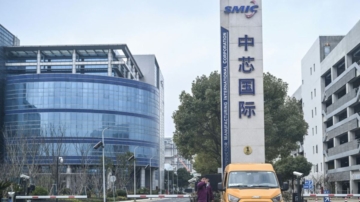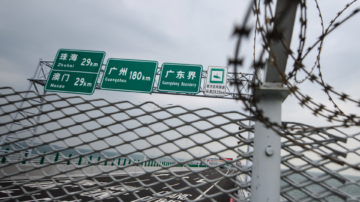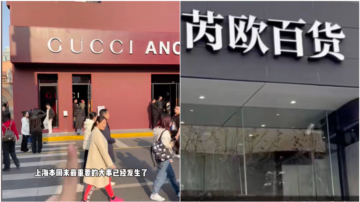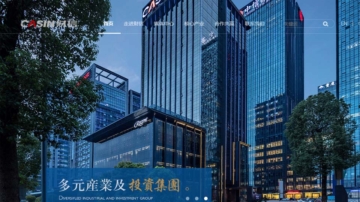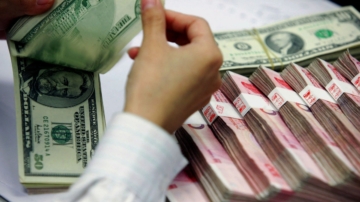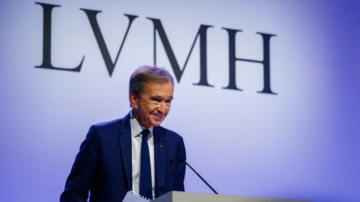【新唐人2014年05月26日讯】最近,外界对大陆房地产市场健康状况,发出的警示之声越来越大,国外评估公司将中国房地产业的展望,从稳定调整到了负面。专家指出,当局霸占了中国的土地,和开发商串通一气,垄断中国的房价和市场,高喊限制购房,让民众产生稀缺心理的同时,不断的推高房价,如今能够装下超过全球一半人口的房子,已经成为引发中国经济崩溃和动乱的火药库。
美国“穆迪”投资服务公司21号宣布,将中国房地产业展望,从“稳定”调整为“负面”。“穆迪”预计,未来12个月,中国的房地产销售将大幅放缓。
截至4月底,“穆迪”跟踪的8个一、二线城市房地产销售库存,接近此前的高点。在展望期内,这些“高库存”将削弱开发商的定价能力,对运营资本和利润率也会产生压力。“穆迪”注意到,房地产的建设支出、土地款项及境外债券到期,也在减少开发商持有的现金量。
美国《华尔街日报》报导说,房地产商从影子银行高利率贷款,就连最大的开发商也受到了冲击。中国收入第二的开发商——“恒大”地产集团,过去四年在海外债券市场募款几乎毫不费力,但今年,“恒大”在影子银行系统大举借贷。美国“渣打”银行估计,“恒大”地产通过影子银行系统融资的利率为10%至12%。而“恒大”去年还发行了40亿美元的永久债券,比现有债务成本还要高得多。除去永久债券,“恒大”地产债务去年增长81%,达到人民币1,088亿元。
北京清华大学经济管理学院教授杨斌:“10%的本金贷出8、90%都有,后面融资的钱还前面的人,他(房地产商)就极力维持资金链不断,怎么办呢,他就以更高的利息吸引资金,资金链不断,他就撑着,断了他就跑路了,国内这种融资手段,基本上是全面的旁氏骗局。”
2011年以来,各地频频出现房地产商跑路现象,去年下半年,光湖南长沙一地就出现6起一房多卖、卷款跑路事件。山东青岛“君利豪集团”老板扔下12亿欠款,跑得无影无踪,河北唐山一家房地产商扔下13亿欠款跑了,害得投资者服毒自杀。今年4月,江苏无锡楼盘没有完工,开发商却消失了,数百购房人血本无归。
国家发改委“城市和小城镇改革发展中心”的课题组,去年调查12个省、区的156个地级市,发现,90%以上的地级市正在规划建设新城新区。有研究数据显示,全国新城新区规划人口达到34亿。这等于规划出来的新城区,能容纳下全世界一半的人口。
大陆经济评论家“牛刀”说,所有买房的人都上当了,民众期待房子能保值,不过在中共滥发钞票,为创造GDP造出来的房子,只是一堆泡沫化了的钢筋水泥,不是稀罕之物。
杨斌:“土地是政府的,是国家垄断的,土地价格垄断的,建房权垄断的,没有好的政府关系做不了房地产商,房地产商和政府的垄断价格,把老百姓的一生的积蓄一次性剥削完毕。”
去年地方本级财政收入6万9000亿,其中六项来自土地及房产相关的税收。而中央财政对地方财政的转移支付总额4万8000亿,其中土地转让金收入4万2000亿。
北京大学光华管理学院博士生导师王建国:“房价高,主要是政府抬起来的。本来政府负债就很厉害,如果土地出卖突然之间下降的话,那政府根本没法运作。”
杨斌:“每次发一次政策,房价涨高一次,让老百姓限购甚么的,是它自己得病了,是它垄断才把价格抬这么高,越限购越买,本来只买一套,一看限购,再买一套吧。”
北京清华大学经济管理学院教授杨斌指出,房地产崩盘会造成金融危机和社会危机,而政府却是危机的系铃人和解铃人,杨斌说,土地私有化才能解决房价问题。
采访编辑/刘惠 后制/舒灿
The Party and Developers Gang Up to Build A Ponzi Scheme
Recently, the sirens are getting louder and louder regarding
the health of Chinese real estate industry.
Overseas rating company has lowered its outlook
for Chinese real estate to negative from stable.
Professionals pointed out that the government monopolizes the land
and gangs up with developers.
Thus, the home price and market has been monopolized.
When calling for the limitation on the number of homes purchased,
it keeps pushing up home prices.
The newly-built homes that can hold more than half of the global population
have become the powder magazine to trigger nationwide economic crash and chaos.
On May 21, Moody's Investors Service lowered its outlook
for Chinese real estate to negative from stable.
Moody’s forecast that Chinese real estate market
would greatly slow down in the next 12 months.
Based on Moody’s tracking record, inventory homes
in medium and big-sized cities have reached record high since April.
Within the projection period, those inventory homes
will weaken developers’ asking prices and
will produce pressure on operational capital and revenue rate.
Moody’s also found out that developers’ working capital also got hit
by construction expenses, land regulations and foreign bonds maturities.
As reported by “The Wall Street Journal”,
investors are forcing Chinese property companies to pay more
to borrow and driving some to the country’s “shadow-banking” system.
Even the biggest developers are getting hit. Evergrande Real Estate Group,
China’s second-largest developer by revenue,
had little trouble borrowing at relatively low interest rates
in the offshore bond market over the past four years.
But this year it has borrowed heavily in the shadow-banking system,
where Standard Chartered estimates the cost of funding on trust products is 10% to 12%.
Evergrande Real Estate Group issued 4 billion U.S. dollars
perpetual bonds with a much higher cost.
Besides the perpetual bonds, the debt of Evergrande Real Estate Group
increased 81% last year to 108.8 billion Chinese Yuan.
Yang Bin, professor of School of Economics and Management Tsinghua University,
“with 10% principal, one can borrow 80 to 90% of that much.
Developers use the money borrowed later to pay off the debt earlier,
trying hard to keep the financing chain intact without being broken.
How can they manage to do that?
They actually attract investors by offering high interest.
As long as the financing chain is working, they’ll linger on.
Once the chain is broken, they’ll run away.
This type of financing is nothing but a Ponzi scheme.”
Since 2011, quite a few developers have run away from debts.
During the second half year in 2013, there were 6 developers
who sold homes to multiple buyers and then ran away with the money.
Owner of “Jun Li Hao Group” from Qingdao, Shandong
left behind 1.2 billion Chinese Yuan debts and ran away.
A developer in Tangshan, Hebei left behind 1.3 billion debts and ran away too.
Desperate investors committed suicide by taking poison.
This April, in Wuxi, Jiangsu, the developer disappeared
before construction work had been completed.
Hundreds of home buyers lost all the money invested```.
Research group of City and Small Town Development and Innovation Center,
National Development and Innovation Committee did research
last year among 156 cities from 12 provinces.
They found that more than 90% medium-sized cities were planning
to build new city districts. The research data show that the population planned
to hold in new city districts amount to 3.4 billion.
It means that new city districts can hold half of the global population.
Niu Dao, economic commentator in China,
stated that all home buyers were fooled.
People hope that the home they bought can maintain its value.
However, in China, the party prints money recklessly.
In order to improve GDP, the homes that have been built
are just steel and concrete, not something valuable.
Yang Bin:“The land in China belongs to and is monopolized by the government.
Both land price and construction rights are monopolized by the party.
If you don’t have a good relationship with the government,
you can never be a developer.
The government and developers gang up and
exploit every penny of the ordinary people’s savings.”
Last year, the total income of local governments is 6,900 billion Chinese Yuan,
in which 6 items are land and property tax revenue.
The transfer payment from the central to the local financing system
is about 4,800 billion, of which 4,200 billion is land transferring fee.
Wang Jianguo, Ph.D. student mentor of Guanghua School of Management,
Beijing University, “The high home price has been bidden up by the government.
The government is under severe debt.
If the land price goes down, the government won’t operate normally.”
Yang Bin:”Whenever a new policy issued, home price will go up even further.
How can ordinary people afford it?
The government is so sick that its monopoly
has made the home price this prohibitive.
The limitation on purchase only stimulates people to buy more homes.
Someone is planning to buy only one house.
When they see the purchase limitation is released, they just buy two instead. ”
Yang Bin:”The crash of the real estate industry will cause financial and social crisis.
The government should undo what it has done.
Only land privatization can solve the issues on home price. ”
Interview & Edit/Liuhui Post-Production/Shucan
美国“穆迪”投资服务公司21号宣布,将中国房地产业展望,从“稳定”调整为“负面”。“穆迪”预计,未来12个月,中国的房地产销售将大幅放缓。
截至4月底,“穆迪”跟踪的8个一、二线城市房地产销售库存,接近此前的高点。在展望期内,这些“高库存”将削弱开发商的定价能力,对运营资本和利润率也会产生压力。“穆迪”注意到,房地产的建设支出、土地款项及境外债券到期,也在减少开发商持有的现金量。
美国《华尔街日报》报导说,房地产商从影子银行高利率贷款,就连最大的开发商也受到了冲击。中国收入第二的开发商——“恒大”地产集团,过去四年在海外债券市场募款几乎毫不费力,但今年,“恒大”在影子银行系统大举借贷。美国“渣打”银行估计,“恒大”地产通过影子银行系统融资的利率为10%至12%。而“恒大”去年还发行了40亿美元的永久债券,比现有债务成本还要高得多。除去永久债券,“恒大”地产债务去年增长81%,达到人民币1,088亿元。
北京清华大学经济管理学院教授杨斌:“10%的本金贷出8、90%都有,后面融资的钱还前面的人,他(房地产商)就极力维持资金链不断,怎么办呢,他就以更高的利息吸引资金,资金链不断,他就撑着,断了他就跑路了,国内这种融资手段,基本上是全面的旁氏骗局。”
2011年以来,各地频频出现房地产商跑路现象,去年下半年,光湖南长沙一地就出现6起一房多卖、卷款跑路事件。山东青岛“君利豪集团”老板扔下12亿欠款,跑得无影无踪,河北唐山一家房地产商扔下13亿欠款跑了,害得投资者服毒自杀。今年4月,江苏无锡楼盘没有完工,开发商却消失了,数百购房人血本无归。
国家发改委“城市和小城镇改革发展中心”的课题组,去年调查12个省、区的156个地级市,发现,90%以上的地级市正在规划建设新城新区。有研究数据显示,全国新城新区规划人口达到34亿。这等于规划出来的新城区,能容纳下全世界一半的人口。
大陆经济评论家“牛刀”说,所有买房的人都上当了,民众期待房子能保值,不过在中共滥发钞票,为创造GDP造出来的房子,只是一堆泡沫化了的钢筋水泥,不是稀罕之物。
杨斌:“土地是政府的,是国家垄断的,土地价格垄断的,建房权垄断的,没有好的政府关系做不了房地产商,房地产商和政府的垄断价格,把老百姓的一生的积蓄一次性剥削完毕。”
去年地方本级财政收入6万9000亿,其中六项来自土地及房产相关的税收。而中央财政对地方财政的转移支付总额4万8000亿,其中土地转让金收入4万2000亿。
北京大学光华管理学院博士生导师王建国:“房价高,主要是政府抬起来的。本来政府负债就很厉害,如果土地出卖突然之间下降的话,那政府根本没法运作。”
杨斌:“每次发一次政策,房价涨高一次,让老百姓限购甚么的,是它自己得病了,是它垄断才把价格抬这么高,越限购越买,本来只买一套,一看限购,再买一套吧。”
北京清华大学经济管理学院教授杨斌指出,房地产崩盘会造成金融危机和社会危机,而政府却是危机的系铃人和解铃人,杨斌说,土地私有化才能解决房价问题。
采访编辑/刘惠 后制/舒灿
The Party and Developers Gang Up to Build A Ponzi Scheme
Recently, the sirens are getting louder and louder regarding
the health of Chinese real estate industry.
Overseas rating company has lowered its outlook
for Chinese real estate to negative from stable.
Professionals pointed out that the government monopolizes the land
and gangs up with developers.
Thus, the home price and market has been monopolized.
When calling for the limitation on the number of homes purchased,
it keeps pushing up home prices.
The newly-built homes that can hold more than half of the global population
have become the powder magazine to trigger nationwide economic crash and chaos.
On May 21, Moody's Investors Service lowered its outlook
for Chinese real estate to negative from stable.
Moody’s forecast that Chinese real estate market
would greatly slow down in the next 12 months.
Based on Moody’s tracking record, inventory homes
in medium and big-sized cities have reached record high since April.
Within the projection period, those inventory homes
will weaken developers’ asking prices and
will produce pressure on operational capital and revenue rate.
Moody’s also found out that developers’ working capital also got hit
by construction expenses, land regulations and foreign bonds maturities.
As reported by “The Wall Street Journal”,
investors are forcing Chinese property companies to pay more
to borrow and driving some to the country’s “shadow-banking” system.
Even the biggest developers are getting hit. Evergrande Real Estate Group,
China’s second-largest developer by revenue,
had little trouble borrowing at relatively low interest rates
in the offshore bond market over the past four years.
But this year it has borrowed heavily in the shadow-banking system,
where Standard Chartered estimates the cost of funding on trust products is 10% to 12%.
Evergrande Real Estate Group issued 4 billion U.S. dollars
perpetual bonds with a much higher cost.
Besides the perpetual bonds, the debt of Evergrande Real Estate Group
increased 81% last year to 108.8 billion Chinese Yuan.
Yang Bin, professor of School of Economics and Management Tsinghua University,
“with 10% principal, one can borrow 80 to 90% of that much.
Developers use the money borrowed later to pay off the debt earlier,
trying hard to keep the financing chain intact without being broken.
How can they manage to do that?
They actually attract investors by offering high interest.
As long as the financing chain is working, they’ll linger on.
Once the chain is broken, they’ll run away.
This type of financing is nothing but a Ponzi scheme.”
Since 2011, quite a few developers have run away from debts.
During the second half year in 2013, there were 6 developers
who sold homes to multiple buyers and then ran away with the money.
Owner of “Jun Li Hao Group” from Qingdao, Shandong
left behind 1.2 billion Chinese Yuan debts and ran away.
A developer in Tangshan, Hebei left behind 1.3 billion debts and ran away too.
Desperate investors committed suicide by taking poison.
This April, in Wuxi, Jiangsu, the developer disappeared
before construction work had been completed.
Hundreds of home buyers lost all the money invested```.
Research group of City and Small Town Development and Innovation Center,
National Development and Innovation Committee did research
last year among 156 cities from 12 provinces.
They found that more than 90% medium-sized cities were planning
to build new city districts. The research data show that the population planned
to hold in new city districts amount to 3.4 billion.
It means that new city districts can hold half of the global population.
Niu Dao, economic commentator in China,
stated that all home buyers were fooled.
People hope that the home they bought can maintain its value.
However, in China, the party prints money recklessly.
In order to improve GDP, the homes that have been built
are just steel and concrete, not something valuable.
Yang Bin:“The land in China belongs to and is monopolized by the government.
Both land price and construction rights are monopolized by the party.
If you don’t have a good relationship with the government,
you can never be a developer.
The government and developers gang up and
exploit every penny of the ordinary people’s savings.”
Last year, the total income of local governments is 6,900 billion Chinese Yuan,
in which 6 items are land and property tax revenue.
The transfer payment from the central to the local financing system
is about 4,800 billion, of which 4,200 billion is land transferring fee.
Wang Jianguo, Ph.D. student mentor of Guanghua School of Management,
Beijing University, “The high home price has been bidden up by the government.
The government is under severe debt.
If the land price goes down, the government won’t operate normally.”
Yang Bin:”Whenever a new policy issued, home price will go up even further.
How can ordinary people afford it?
The government is so sick that its monopoly
has made the home price this prohibitive.
The limitation on purchase only stimulates people to buy more homes.
Someone is planning to buy only one house.
When they see the purchase limitation is released, they just buy two instead. ”
Yang Bin:”The crash of the real estate industry will cause financial and social crisis.
The government should undo what it has done.
Only land privatization can solve the issues on home price. ”
Interview & Edit/Liuhui Post-Production/Shucan

